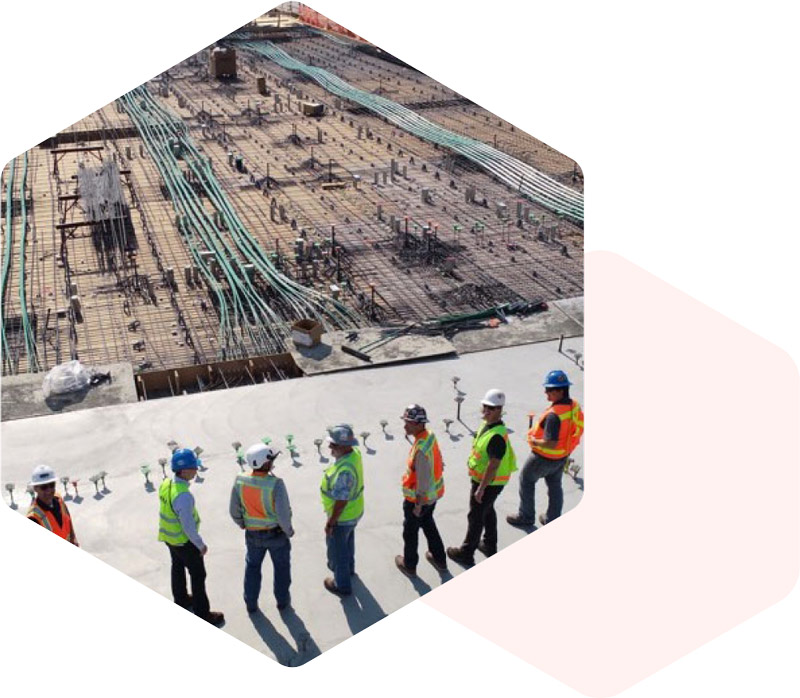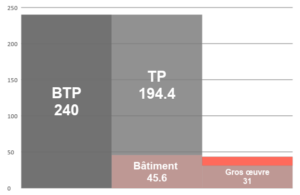Extended Producer Responsibility for the building sector
What is Building EPR?
The principle of Extended Producer Responsibility or EPR requires all entities responsible for placing building products or materials on the French market to finance or organize the prevention and management of waste from their products and materials at the end of their life.
In practice
Producers of products on the market join an eco-organization approved by the public authorities and transfer this obligation to it in exchange for a financial contribution (the eco-contribution) based on the quantities of products put on the market. The eco-organization then organizes the management of waste from their end-of-life products.

For more information
The principle of EPR is enshrined in the law in Article L541-10 of the Environmental Code, which states that ". In application of the principle of extended producer responsibility, any natural or legal person who develops, manufactures, handles, treats, sells or imports waste-generating products or elements and materials used in their manufacture, [...], may be required to provide for or contribute to the prevention and management of the waste they generate (...). Producers fulfill their obligation by collectively setting up approved eco-organizations, whose governance they ensure and to which they transfer their obligation and pay a financial contribution in return. " Today, EPR concerns some twenty sectors in France, such as household packaging and electrical and electronic equipment.... With the promulgation of the law on the fight against waste and the circular economy of February 10, 2020, known as the AGEC law (Anti-Waste and Circular Economy), the PMCB are in turn concerned by this measure. To meet this legal obligation, PMCB marketers must join an eco-organization approved by the public authorities, to which they transfer their obligation by paying a financial contribution in return. |
France is the country that has most developed this logic of producer responsibility
Today, more than 30 EPR channels channels exist in France and new ones will be created in the next 5 years. Among them, the EPR sector for Building Products and Materials (BPM) provided for by the AGEC law law (to promote the circular economy and fight against waste), which will be implemented from 1st January 2022.

The PMCB EPR was created by the AGEC law. The law stipulates that PMCBs will be covered by EPR as of January 1, 2022 and that the waste from them will be taken back free of charge when it is collected separately, so that the traceability of this waste is ensured.
The implementation decree relating to the establishment of the EPR PMCB establishes the definitions and operation of the EPR. The decree is integrated into the environmental code:
The decree defines the PMCBs covered by EPR as " products and materials, including wall, floor and ceiling coverings, that are intended to be incorporated, installed or assembled permanently in a building or used for the facilities related to its use located on its site, including those related to vehicle parking, and with the exception of products and materials used solely for the duration of the construction site".. In particular, it excludes products and materials intended for civil engineering or public works from the scope of EPR and also qualifies the marketer (see Are you a relevant marketer?).
The decree provides numerous details on the operation of the separate collection of PMCB and the deployment of mesh points.
The text specifies the terms and conditions of financing and its increase in power.
It also provides for take-back obligations for distributors whose sales area (all areas dedicated to the sale of PMCB, including adjoining or nearby storage areas intended for the supply of these products and materials to customers) is greater than 4,000 m².
The operational start of the EPR building :
important issues
Concerning EPR in the building sector, in concrete terms, this concerns "Construction products or materials from the building sector intended for households or professionals, as of January 1, 2022, so that construction or demolition waste from them is taken back free of charge when it is collected separately and so that the traceability of this waste is ensured. A decree in the Council of State defines the terms of application [...] as well as the minimum conditions of the network of take-back points" according to article L.541-10-1 of the Environment Code (AGEC Law).
The two main issues that motivated the implementation of this new EPR building sector in the AGEC law are
- Reducing illegal dumping by improving collection through free pick-up of waste, increasing the density of collection points, and improving traceability
- Preventing the saturation of landfills by developing material recycling and reuse
Each year, nearly 46 million tons of waste are produced by the construction industry. Even if the recovery rate of this waste is estimated at nearly 70%, with some heterogeneity according to the situation of the different flows, there is still a lot to do and the environmental and economic stakes for the sector are high.

Good to know: Construction products and materials for the public works sector (roads, bridges, etc.) are excluded from the EPR obligation.
Obligations of issuers on the market :
together for a more responsible building
Producer obligations:
Distributors' obligations
How does the eco-contribution finance EPR?
Marketers fulfill their obligation by collectively setting up approved eco-organizations, whose governance they ensure and to which they transfer their obligation by paying a financial contribution in return: this is the eco-contribution".
Indeed, in order to operate and implement the actions inherent to its objectives, EPR needs to be financed and this is where eco-contribution Producers add an eco-contribution to the sale price of their products to offset the logistical costs of collection and processing. The eco-contribution is calculated according to the effort to be made collectively to reach the set targets.
This eco-contribution allows the eco-organization to finance its actions:
- to assist its members who are marketers in their administrative procedures
- structuring downstream waste collection, sorting and recovery channels
- strengthening upstream industries through eco-design
- inform and raise awareness among the various audiences
What is the role of the eco-organization Valobat in the EPR PMCB?
Valobat, a company created by 26 partners who are leaders in the construction sector, has applied for approval to become a multi-material eco-organization for all flows (inert and non-inert). Its ambition? To offer a solution for each building waste and for each stakeholder of the ecosystem of the sector.
The eco-organization, along with all the actors, aims to :
- develop reuse,
- increase the recycling rate,
- increase the recovery rate,
- facilitate the incorporation of recycled material,
- support the development of eco-design.
Ambitions consistent with the expectations of marketers, in the context of the RE 2020 (New Environmental Regulation).
To achieve this, Valobat has defined the necessary means to reach its objectives, namely
- develop the territorial network,
- to set up a free take-back service for separately collected flows,
- contribute to the reduction of illegal dumping,
- implement communication and awareness actions for the actors,
- invest in Research & Development.
Solutions developed with a view to operational and economic optimization for the benefit of marketers.
The decree of June 10, 2022 on the specifications allowed Valobat to submit its application for approval to the public authorities.
These specifications define the terms of implementation of the sector and the objectives to be achieved by the eco-organization.
It contains all the obligations of the eco-organization in terms of :
- Development of eco-modulations (from 2024);
- Development of the territorial network of collection points (every 10 or 20 km);
- Studies to be carried out (reuse, substances limiting recycling...) ;
- Development of free take-back for sorted waste;
- Traceability ;
- Development of reuse and recycling ;
- Financing of awareness and communication actions.
Valobat's approval order: In July 2022, Valobat submitted an application for approval to the public authorities. This application describes Valobat's governance, its technical and economic capacity to become an eco-organization, its project dedicated to the building sector and the methods for achieving the objectives of the specifications. On the basis of this request for approval, Valobat is now approved and offers its membership contract to PMCB marketers.


